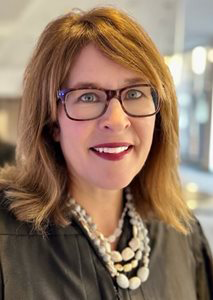District Court Judge

Counties: Pennington County, Kittson County
View state court bio
Contact with Chambers
• Preferred method to contact chambers: Email
• To whom may attorneys direct scheduling/logistical questions? Judge, law clerk, court reporter.
• To whom may attorneys direct substantive questions? Judge, law clerk, court reporter.
• Set forth your practices and procedures for scheduling motion hearings. Contact judge, law clerk, court reporter.
• Identify any type of motion for which you do not require a hearing. Stipulated matters.
• Do you accept telephone calls from attorneys to rule on discovery disputes that occur during depositions? Yes.
• How much time do you allot for motion hearings? 30 minutes or will grant more time if attorney requests.
• Set forth your practices and procedures with respect to attending a hearing by telephone or video conference. Remote attendance permitted unless testimony expected.
• Do you want to receive paper courtesy copies of the parties' written submissions? If you do, set forth the number of courtesy copies and identify any document type you do not want to receive. No need for paper copies if they are e-filed or in MNDES.
Pre-Trial Procedures
• Set forth your practices and procedures with respect to the submissions of additional legal authority or other materials at or after oral arguments. Attorneys are permitted to submit this information during the hearing and am also willing to hold the record open for additional submissions (to be discussed at the hearing).
• Describe your preferred procedures for pretrial settlement conferences, including the timing of such conferences, persons who must attend, whether persons may attend by telephone or video conference, and how you participate in settlement discussions. These are generally held 2 weeks prior to trial; the exact date / nature of the conference is determined during the initial scheduling hearing.
• Identify what technology you use in the courtroom and state whether you prefer a particular electronic format. All of the judicial branch technology.
• Set forth your practices and procedures with respect to attorney’s use of technology in the courtroom and during trial. Am flexible with attorneys about their use of technology.
• Do you permit parties to bifurcate oral argument so different attorneys address different legal issues? Yes.
In-Person Trials
• Are you willing to provide a date certain for trial? Yes.
• Set forth your practices and procedures for handling motions in limine. Generally included with settlement hearings (to be heard if settlement not reached).
• What is your schedule for a typical trial day? Meet with attorneys at 8:30 am; start 9 am; take breaks as needed; stop around 4:30 pm.
• Do you impose time limits with respect to opening statements and closing arguments? No.
• Set forth your practices and procedures with respect to marking and using exhibits. If a lot of exhibits, it's preferred that this occur prior to trial.
• Set forth any other preferences, practices, or procedures attorneys and parties may find helpful. Am pretty flexible working with attorneys; many of these issues can be figured out during the initial scheduling conference and the settlement / pretrial conference.